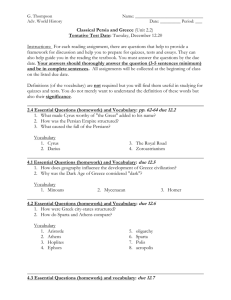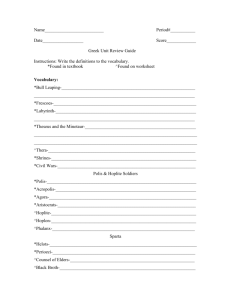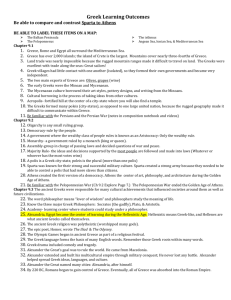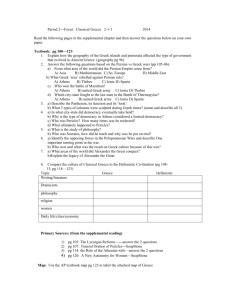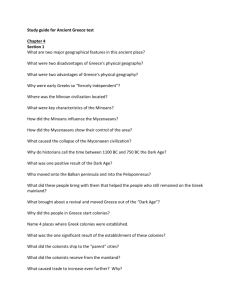Classical Greece
advertisement
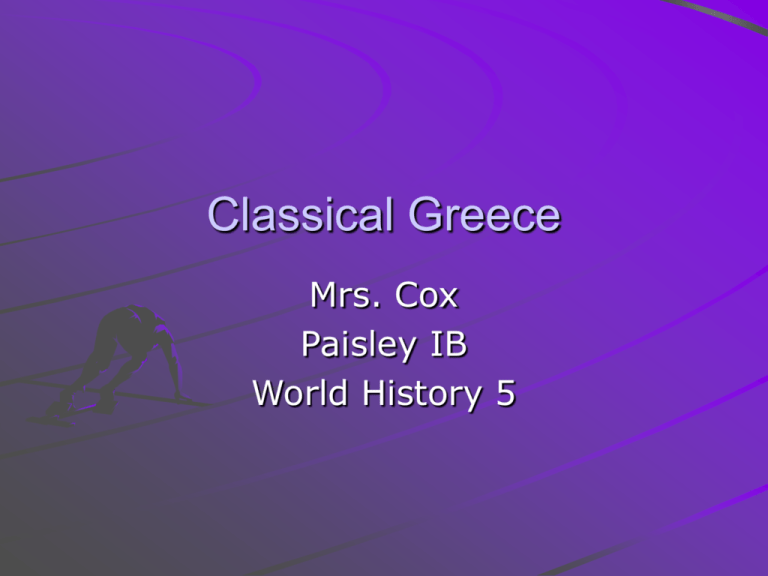
Classical Greece Mrs. Cox Paisley IB World History 5 Vocabulary 1. 2. 3. 4. 5. 6. 7. 8. polis acropolis agora helots hoplites hubris democracy solon Vocabulary 9. tyrant 10. Cleisthenes 11. direct democracy 12. archon 13. phalanx 14. Pericles 15. Socrates 16. Plato Vocabulary 17. 18. 19. 20. 21. 22. 23. 24. Aristotle reason reason logic Homer lyric poetry Herodotus Thucydides Vocabulary 25. 26. 27. 28. 29. Alexander the Great Hellenistic Euclid Eratosthenes Archimedes Questions 1.Name three known aspects about Minoan civilization? 2.How were the Minoans and Mycenae similar? How are they difference? 3. Why do you think each polis followed the layout described here? 4. Do you think the Spartans’ focus on readiness for war was worthwhile? Why or why not? Questions 5. How did Solon change law and government in Athens? 6. Name three different groups that helped govern Athens at the height of democracy. 7. The Persians invaded Greece twice looking for revenge. What made them seek revenge each time? 8. What were the elements that contributed to Athens’s Golden Age. Questions 9. Why do you think that Sparta could not maintain control over Greece? 10. What is the Socratic method? 11. Why do you think Plato believed that political leaders should be philosophers? Do you agree? Why or why not? 12. Why do you think Homer’s epics influenced Greek culture for centuries? 13. How are the histories written by Herodotus similar to the Iliad? How are they different? Questions 14. What features did the ancient Greeks use in their art and architecture? 15. Why was Philip II able to conquer Greece so easily? 16. What places did Alexander the Great conquered. 17. Why do you think Alexander made such a strong effort to blend the cultures in his empire? 18. How did life change in cities in the Hellenistic world? Questions 19. What was the focus of each of the three new schools of philosophy? Minoans and Mycenaeans Much of early Greek history is still unknown. We do know that two cultures developed in early Greece. Minoan civilization developed on the island of Crete around 2100 BC and lasted at least 700 years. Minoans settled on many Aegean islands and traded among these colonies and Crete. Minoans and Mycenaeans We know about Minoans from excavations at Knossos on Crete, particularly from the artwork; Minoans had writing, but historians have not been able to translate it. Minoan life was tied deeply to the sea. Women had important roles in society, and warfare did not seem to be a part of life. Minoans and Mycenaeans We know their civilization fell apart quickly. The eruption of the volcano on There, near Crete, may have weakened society. The Mycenaeans from the Greek mainland conquered the Minoans. The Mycenaeans built city-states that often fought one another. Minoans and Mycenaeans Because they spoke an early form of Greek, they are considered the first Greek civilization. They traded with the Minoans, then expanded their own trade after conquering Crete. Mycenaean civilization was dominated by war, competition, and powerful kings who built palaces and monuments. Minoans and Mycenaeans One legend tied to the Mycenaeans is about the Trojan War, in which Greeks, led by Mycaenae, fought against the city of Troy. It is unclear whether the Trojan War really happened. But it is known that war, along with drought, famine, the collapse of trade, and invasion from outside, helped to end Mycenaean civilization. Minoans and Mycenaeans Their cities were mostly in ruins by 1100 BC, and a dark age followed. As people struggled to feed and protect themselves, the use of writing was lost for several centuries. Greek civilization almost disappeared. Greek City-States By the 800s BC, a new type of society emerged in Greece, centered around the polis, or city-state. The polis was the basic political unit and center of daily life and culture. People were very loyal to their polis. The typical polis was built around a high area called an acropolis, which held temples to the gods and space for ceremonies. Greek City-States Below the acropolis was the agora or marketplace, surrounded by shops, houses, more temples, and a gymnasium. Around the polis was a wall for defense, and outside the wall were fields for crops. Each polis developed its own political system. Corinth was an oligarchy, Athens a democracy, and Thebes an aristocracy. Greek City-States Sparta was a mighty city-state, but unlike the others. It conquered nearby towns and made the people helots or state slaves. Helots were given to Spartans to do their manual labor so that the citizens could spend all their time training for war. This was believed to be the only way to keep order because the helots outnumbered the Spartans and might rebel at any time. Greek City-State So Spartans demanded that their citizens be tough from birth. Babies who were not healthy were left in the wild to die. Boys entered a school for combat at age 7. At 20, they became hoplites or foot soldiers, and served in the army for 10 years. Women were also expected to be physically fit and helped to run the city when men were away at war. Greek City-State Sparta was led by two military commander kings but eventually, an elected council of elders made many decisions. Gods and Heroes Ancient Greeks believed in hundreds of gods and goddesses. Each ruled over one part of nature or life. The Greeks believed the gods would protect them in exchange for sacrifices. About 12 of the gods were especially important and were thought to live on Mount Olympus, the highest mountain in Greece. Gods and Heroes The gods were powerful, but they were not perfect. They often got jealous or made mistakes. Most Greeks worshipped the same gods, but each polis also claimed one god or goddess as its protector. In addition, all Greeks considered some locations sacred, such as Delphi, where priestesses were thought to receive visions of the future, and Olympus, where games were held every four years. Gods and Heroes Athletes from different city-states competed in honor of the gods. Greeks also had myths about heroes that could inspire people to live virtuously but without hubris, great pride that often led heroes to tragic ends. Athenian Democracy The government of Athens was the world’s first democracy, run by the people. But Athens had not always been democratic. First it was ruled by kings, then aristocrats. Most Athenians were poor and had little power. This led to conflict between rich and poor. Athenian Democracy Harsh laws made the dispute between rich and poor worse, so in the 590s BC, a lawmaker named Solon got rid of the harshest laws, introduced trial by jury, and created a council of 400 elected men to help govern. Men from any social class could be elected. Athenian Democracy This was the first real step toward democracy. But tensions in Athens flared again, so Peisistratus, a tyrant, seized power by force. After he died, Cleisthenes took over. He increased the council to 500 and gave men from every class the same rights. Athenian Democracy However, only free male Athenians over age 20 who owned property and had military training were allowed to vote. In the 300s BC, that was about 10 percent of the population. Those who could were expected to vote in all elections, to serve if elected, and to serve on juries and in the military if needed. Athenian Democracy At its height, Athenian democracy. The Council of 500 wrote the laws that would be voted on by the assembly. The third part was the courts. Members of the courts came from the assembly. One elected official was the archon, who acted as the head of both the assembly and the Council of 500. The Persian Wars In the 500s BC, Persia had conquered Greek cities in Ionia, in what is now Turkey. When the Ionians rebelled, they asked their fellow Greeks for help. The Persians quickly put down the revolt, then attacked the Greek mainland, especially Athens, in revenge. The Persian Wars In 490 BC, thousands of Persians landed near a town called Marathon. The Athenians surprised the Persians and defeated them. The Athenians fought in a phalanx, a tight rectangle formation in which soldiers held long spears out ahead of their shields. The Persian Wars The Persians planned revenge. In 480 BC, a huge army entered Greece. The citystates worked together. The Persians burned Athens, but the entire Greek fleet was in the nearby Bay of Salamis. The Greeks destroyed Persian supply ships that tried to reach the mainland, stranding the Persian army. In 479, Sparta led the Greek army to victory in the Persian Wars. The Golden Age of Athens Eventually, Athens became the leading city-state in Greece. It led the Delian League, an alliance of several city-states for defense. Those who resented Athens’ power and rebelled were attacked. The league was basically an Athenian empire. The Golden Age of Athens Athens had been burned and had to be rebuilt after the Persian Wars. Several temples including the Parthenon, roads, and walls were built, and the port was expanded. Much of the rebuilding was due to Pericles, a military and political leader in the 460s BC. The Golden Age of Athens Although he had a lot of power, he supported democracy. He also supported the arts, wanting Athens to be the most glorious city in Greece. During this Golden Age, trade brought wealth to Athens, and merchants brought new food and customs, making the city very cosmopolitan. There were also festivals, religious games, and great dramas. The Peloponnesian War Sparta wanted to end the Delian League’s dominance, so they formed the Peloponnesian League with allies. Athens and Sparta declared war on each other in 431 BC. At first, Sparta dominated on land. Athens at sea. After a few years, they agreed to a truce. This lasted six years, then Athens attacked one of Sparta’s allies. The Peloponnesian War This time, Sparta destroyed the Athenian fleet. Athens had to surrender. The war nearly destroyed Athens, and also damaged Sparta. Sparta tried to dominate Greece, but is was worn down. In 371 BC Thebes defeated Sparta but could not maintain control either. In the 350s BC, Macedonia, a Greek-speaking kingdom to the north, took control of all of Greece. Greek Philosophy The people of ancient Greece were great believers in philosophy. The golden age of Greek philosophy was the 400s-300s BC, when the three greatest Greek philosophers lived: Socrates, Plato, and Aristotle. What we know about Socrates comes form his students. He was interested in concepts like truth, justice, and virtue. Greek Philosophy He asked questions like, “What is truth?” When someone answered, he challenged the answer with more questions. This is known as the Socratic method. Plato was Socrates’ student and a great philosopher also. He wrote on topics like truth and government. Greek Philosophy To spread philosophical ideas, he founded the Academy. It became the most important philosophy school in Greece. Aristotle became another great philosopher. He was more concerned with the nature of the world than with human nature, which had been Socrates’ and Plato’s focus. Greek Philosophy He emphasized the importance of reason, or clear and ordered thinking, and logic. This is the process of making inferences, using what we already know to learn something new. Greek Literature The ancient Greek’s development of poetry, drama, and history still influence European culture. Around 800 BC, heroic stories began to take form. The legendary blind poet Homer, who may or may not have been a real person, told a mixture of history and legend about the Trojan War in two epics, the Iliad and Odyssey. Greek Philosophy The people of ancient Greece were great believers in philosophy. The golden age of Greek philosophy was the 400s-300s BCE, when the three greatest Greek philosophers lived: Socrates, Plato, and Aristotle. Greek Philosophy What we know about Socrates comes form his students. He was interested in concepts like truth, justice, and virtue. He asked questions like, “What is truth?” When someone answered, he challenged with more questions. This is known as the Socratic method. Greek Philosophy Plato was Socrates’ student and a great philosopher also. He believed governments should be led by philosophers. To spread philosophical ideas, he founded the Academy. It became the most important philosophy school in Greece. Greek Philosophy Aristotle became another great philosopher. He was more concerned with the nature of the world than with human nature, which had been Socrates’ and Plato’s focus. He emphasized the importance of reason, or clear and ordered thinking, and logic. This is the process of making inferences, using what we already know to learn something new. Greek Literature The ancient Greek’s development of poetry, drama, and history still influence European culture. Around 800 BCE, heroic stories began to take form. The legendary blind poet Homer, who may or may not have been a real person, told a mixture of history and legend about the Trojan War in two epics, the Iliad and the Odyssey. Greek Literature The Iliad describes the long conflict of the Trojan War. The Odyssey describes the efforts of Odysseus to get home after the war. In both stories, the gods argue and take sides, and there are human heroes and villains. These stories influenced Greek culture for centuries. Greek Literature The earliest examples of Greek poetry are epics like the Iliad and Odyssey. Literature started when these oral stories were written down. At about the same time, the poet Hesiod wrote poems about everyday Greek life, and also about the gods. By the 600s BCE, Greeks such as Sappho and Pindar were composing lyric poetry, which was sung with the accompaniment of an instrument called a lyre. Greek Literature At first, drama was much like poetry; a chorus of singers told a story. Over time the stories became more complicated. At the festival of Dionysus, playwrights competed for prizes. Aeschylus (ees-ky-luss) created drama based on myths. Greek Literature Sophocles specialized in tragedy, the destruction of noble characters by their fatal flaws. Euripides also wrote tragedies, many of them about women. Comedy also developed, usually in the form of satire. The greatest Athenian comic writer was Aristophanes. Greek Literature Around the same time that drama was being developed, Athenians were also writing history. The first major historian was Herodotus, who lived during the wars with Persia and wrote about them. He use prose, an tried to describe major events as they actually happened. Greek Literature Thucydides lived during the Peloponnesian War and used primary sources like speeches to write about it in detail. Bothe historians tried to understand why events happened as they did. Xenophon picked up when Thucydides left off, but concentrated more on describing famous men. Greek Architecture and Art The Greeks appreciated the natural world, and tried to understand it using math and science. They wanted art and architecture to represent the world as they saw it, and to create balance, proportion, and harmony. Greek Architecture and Art Painting and sculpture portrayed real human beings as ideals. Architecture used clean, simple geometry arranged for balance. The Greeks developed methods for exploring scientific subjects that last to this day, such as the use of reason and logic. Greek Architecture and Art Pythagoras, who believed that the universe was held together by mathematics, helped discover the rules of geometry in the 500s BCE. In the 300s BCE, Euclid wrote books on geometry and math that formed the basis for later European studies. Greek Architecture and Art In the late 400s, Hippocrates studied human illnesses, trying to cure them. Today, doctors swear a “Hippocratic oath” naming their ethical duties and the methods they will use. Alexander the Great In 359 BCE, King Philip II took power in Macedonia, the country just north of Greece. He reorganized the army. Then he set out to conquer Greece. Most citystates did not realize the danger, so he faced little opposition. The Macedonians quickly crushed the armies that stood against them, and conquered every major Greek city-state except Sparta. King Philip was assassinated in 336 BCE, so his 20 year old son took over. We know him as Alexander the Great. Alexander the Great Alexander had been trained to rule from birth, so was ready to lead. As soon as he took over, there were rebellions in Greece. He used harsh measures to reestablish his rule: when Thebes rebelled, he crushed its army and burned the city. After getting Greece under control, he went into Asia to fight the large but disorganized Persian army. Alexander the Great Alexander’s army was smaller but well-trained and loyal. He won several major victories in Asia Minor, then went into Phoenicia and Egypt, which were also ruled by Persia. He was greeted as a liberator; the Egyptians even made him pharaoh. He then marched into what is now Iraq, where he destroyed the Persian army. Alexander the Great But he was not yet satisfied. He led his army deeper into Central Asia, to the Indus river. At that point his soldiers had had enough, so Alexander turned back. Alexander built a huge empire, but in 323 he fell ill and died at age 33. He had not named an heir, so his generals fought among themselves for power. In the end, the empire was divided among three of them: Antigonus rule Macedonia and Greece, Seleucis took over the former Persian Empire, and Ptolemy ruled Egypt. The Hellenistic World By creating a huge new empire, Alexander brought about a new culture, blending elements form Greece, Persia, Egypt, Central Asia and other regions. Historians call this culture Hellenistic, or Greek like. Alexander worked to bring people and ideas together. He appointed officials from various cultures to help rule. He also built dozens of new cities (most named Alexandra) throughout the empire an encouraged Greeks to move to them. The Hellenistic World The most famous of these was in Egypt at the mouth of the Nile. It became Egypt’s capital and at one time had the busiest harbor in the world. Palaces and monuments were built, such as the Pharos lighthouse and the great library. It became a center for culture and learning. The Hellenistic World Many other cities throughout the empire also became trading centers. Traders went to East Africa, Arabia, India, and even China. Traders helped spread not only goods but ideas like the teachings of Judaism. The shift to a Hellenistic world brought drastic changes to people’s lives. The Hellenistic World Perhaps most importantly, the citystate was no longer the main political unit. Traditional forms of government such as democracy were replaced with monarchy. Women’s lives also changed: for the first time, they were given the rights to be educated and to own property. Hellenistic Achievements The blending of cultures in the Hellenistic world led to an exchange of ideas, which then led to advances in philosophy, literature, and science. Interest in philosophy spread, and new schools of philosophy developed. One was the Cynics. They rejected pleasure, wealth, and social responsibility, believing people should live according to nature. Hellenistic Achievements The Epicureans, on the other hand, thought people should seek out pleasure and try to avoid pain. Stoics emphasized reason, self-discipline, emotional control and personal morality. Artists in this period learned to convey emotion and movement in their works. Hellenistic Achievements Women became much more common subjects of art. This was also true in literature, where love stories became popular for the first time. There were also important advances in science, especially in Egypt. Euclid formulated many ideas about geometry, while Eratosthenes calculated the circumference of the globe. Hellenistic Achievements Others studied the movement of the stars and the workings of the human body. Archimedes, one of the greatest inventors of the ancient world, used math and physics to design machines such as pulleys to lift heavy loads and a mechanical screw for drawing water out of a well.


